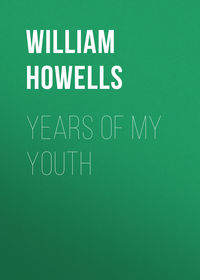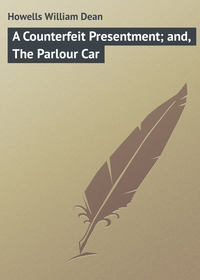 полная версия
полная версияA Boy's Town
If the boys could do little with the Hydraulic, they were at no loss in regard to the Reservoirs, into which its feeding waters were gathered and held in reserve, I suppose, against a time of drought. There was the Little Reservoir first, and then a mile beyond it the Big Reservoir, and there was nearly always a large flat boat on each which was used for repairing the banks, but which the boys employed as a pleasure-barge. It seemed in some natural way to belong to them, and yet they had a feeling of something clandestine in pushing out on the Reservoir in it. Once they filled its broad, shallow hold with straw from a neighboring oatfield, and spent a long golden afternoon in simply lying under the hot September sun, in the middle of the Reservoir, and telling stories. My boy then learned, for the first time, that there was such a book as the "Arabian Nights;" one of the other boys told stories out of it, and he inferred that the sole copy in existence belonged to this boy. He knew that they all had school-books alike, but it did not occur to him that a book which was not a Reader or a Speller was ever duplicated. They did nothing with their boat except loll in it and tell stories, and as there was no current in the Reservoir, they must have remained pretty much in the same place; but they had a sense of the wildest adventure, which mounted to frenzy, when some men rose out of the earth on the shore, and shouted at them, "Hello, there! What are you doing with that boat?" They must have had an oar; at any rate, they got to the opposite bank, and, springing to land, fled somewhere into the vaguest past.
The boys went in swimming in the Little Reservoir when they were not in the River or the Basin; and they fished in the Big Reservoir, where the sunfish bit eagerly. There were large trees standing in the hollow which became the bed of the Reservoir, and these died when the water was let in around them, and gave the stretch of quiet waters a strange, weird look; about their bases was the best kind of place for sunfish, and even for bass. Of course the boys never caught any bass; that honor was reserved for men of the kind I have mentioned. It was several years before the catfish got in, and then they were mud-cats; but the boys had great luck with sunfish there and in the pools about the flood-gates, where there was always some leakage, and where my boy once caught a whole string of live fish which had got away from some other boy, perhaps weeks before; they were all swimming about, in a lively way, and the largest hungrily took his bait. The great pleasure of fishing in these pools was that the waters were so clear you could see the fat, gleaming fellows at the bottom, nosing round your hook, and going off and coming back several times before they made up their minds to bite. It seems now impossible that my boy could ever have taken pleasure in the capture of these poor creatures. I know that there are grown people, and very good, kind men, too, who defend and celebrate the sport, and value themselves on their skill in it; but I think it tolerable only in boys, who are cruel because they are thoughtless. It is not probable that any lower organism but still, I believe that even a fish knows a dumb agony from the barbs of the hook which would take somewhat from the captor's joy if he could but realize it.
"In corporal sufferance feels a pang as greatAs when a giant dies,"There was, of course, a time when the Hydraulic and the Reservoirs were not where they afterwards appeared always to have been. My boy could dimly recall the day when the water was first let into the Hydraulic, and the little fellows ran along its sides to keep abreast of the current, as they easily could; and he could see more vividly the tumult which a break in the embankment of the Little Reservoir caused. The whole town rushed to the spot, or at least all the boys in it did, and a great force of men besides, with shovels and wheelbarrows, and bundles of brush and straw, and heavy logs, and heaped them into the crevasse, and piled earth on them. The men threw off their coats and all joined in the work; a great local politician led off in his shirt-sleeves; and it was as if my boy should now see the Emperor of Germany in his shirt-sleeves pushing a wheelbarrow, so high above all other men had that exalted Whig always been to him. But the Hydraulic, I believe, was a town work, and everybody felt himself an owner in it, and hoped to share in the prosperity which it should bring to all. It made the people so far one family, as every public work which they own in common always does; it made them brothers and equals, as private property never does.
Of course the boys rose to no such conception of the fact before their eyes. I suspect that in their secret hearts they would have been glad to have seen that whole embankment washed away, for the excitement's sake, and for the hope of catching the fish that would be left flopping at the bottom of the Reservoir when the waters were drained out, I think that these waters were brought somehow from Old River, but I am not sure how. Old River was very far away, and my boy was never there much, and knew little of the weird region it bounded. Once he went in swimming in it, but the still, clear waters were strangely cold, and not like those of the friendly Miami. Once, also, when the boys had gone into the vast woods of that measureless continent which they called the Island, for pawpaws or for hickory-nuts, or maybe buckeyes, they got lost; and while they ran about in terror, they heard the distant lowing and bellowing of cattle. They knew somehow, as boys know everything, that the leader of the herd, which ranged those woods in a half-savage freedom, was a vicious bull, and as the lowing and bellowing sounded nearer, they huddled together in the wildest dismay. Some were for running, some for getting over a fence near by; but they could not tell which side of the fence the herd was on. In the primitive piety of childhood my boy suggested prayer as something that had served people in extremity, and he believed that it was the only hope left. Another boy laughed, and began to climb a tree; the rest, who had received my boy's suggestion favorably, instantly followed his example; in fact, he climbed a tree himself. The herd came slowly up, and when they reached the boys' refuge they behaved with all the fury that could have been expected – they trampled and tossed the bags that held the pawpaws or buckeyes or hickory-nuts; they gored the trees where the boys hung trembling; they pawed and tossed the soft earth below; and then they must have gone away, and given them up as hopeless. My boy never had the least notion how he got home; and I dare say he was very young when he began these excursions to the woods.
In some places Old River was a stagnant pool, covered with thick green scum, and filled with frogs. The son of one of the tavern-keepers was skilled in catching them, and I fancy supplied them to his father's table; the important fact was his taking them, which he did by baiting a cluster of three hooks with red flannel, and dropping them at the end of a fish-line before a frog. The fated croaker plunged at the brilliant bait, and was caught in the breast; even as a small boy, my boy thought it a cruel sight. The boys pretended that the old frogs said, whenever this frog-catching boy came in sight, "Here comes Hawkins! – here comes Hawkins! Look out! – look out!" and a row of boys, perched on a log in the water, would sound this warning in mockery of the frogs or their foe, and plump one after another in the depths, as frogs follow their leader in swift succession. They had nothing against Hawkins. They all liked him, for he was a droll, good-natured fellow, always up to some pleasantry. One day he laughed out in school. "Was that you laughed, Henry?" asked the teacher, with unerring suspicion. "I was only smiling, Mr. Slack." "The next time, see that you don't smile so loud," said Mr. Slack, and forgave him, as any one who saw his honest face must have wished to do. They called him Old Hawkins, for fondness; and while my boy shuddered at him for his way of catching frogs, he was in love with him for his laughing eyes and the kindly ways he had, especially with the little boys.
VI.
SCHOOLS AND TEACHERS
My boy had not a great deal to do with schools after his docile childhood. When he began to run wild with the other boys he preferred their savage freedom; and he got out of going to school by most of the devices they used. He had never quite the hardihood to play truant, but he was subject to sudden attacks of sickness, which came on about school-time and went off towards the middle of the forenoon or afternoon in a very strange manner. I suppose that such complaints are unknown at the present time, but the Young People's fathers can tell them how much suffering they used to cause among boys. At the age when my boy was beginning to outgrow them he was taken into his father's printing-office, and he completed his recovery and his education there. But all through the years when he lived in the Boy's Town he had intervals of schooling, which broke in upon the swimming and the skating, of course, but were not altogether unpleasant or unprofitable.
They began, as they are apt to do, with lessons in a private house, where a lady taught several other children, and where he possibly learned to read; though he could only remember being set on a platform in punishment for some forgotten offence. After that he went to school in the basement of a church, where a number of boys and girls were taught by a master who knew how to endear study at least to my boy. There was a garden outside of the schoolroom; hollyhocks grew in it, and the boys gathered the little cheeses, as they called the seed-buttons which form when the flowers drop off, and ate them, because boys will eat anything, and not because they liked them. With the fact of this garden is mixed a sense of drowsy heat and summer light, and that is all, except the blackboard at the end of the room and a big girl doing sums at it; and the wonder why the teacher smiled when he read in one of the girls' compositions a phrase about forging puddings and pies; my boy did not know what forging meant, so he must have been very young. But he had a zeal for learning, and somehow he took a prize in geography – a science in which he was never afterwards remarkable. The prize was a little history of Lexington, Mass., which the teacher gave him, perhaps because Lexington may have been his native town; but the history must have been very dryly told, for not a fact of it remained in the boy's mind. He was vaguely disappointed in the book, but he valued it for the teacher's sake whom he was secretly very fond of, and who had no doubt won the child's heart by some flattering notice. He thought it a great happiness to follow him, when the teacher gave up this school, and took charge of one of the public schools; but it was not the same there; the teacher could not distinguish him in that multitude of boys and girls. He did himself a little honor in spelling, but he won no praise, and he disgraced himself then as always in arithmetic. He sank into the common herd of mediocrities; and then, when his family went to live in another part of the town, he began to go to another school. He had felt that the teacher belonged to him, and it must have been a pang to find him so estranged. But he was a kind man, and long afterwards he had a friendly smile and word for the boy when they met; and then all at once he ceased to be, as men and things do in a boy's world.
The other school was another private school; and it was doubtless a school of high grade in some things, for it was called the Academy. But there was provision for the youngest beginners in a lower room, and for a while my boy went there. Before school opened in the afternoon, the children tried to roast apples on the stove, but there never was time, and they had to eat them half raw. In the singing-class there was a boy who wore his hair so enviably long that he could toss it on his neck as he wheeled in the march of the class round the room; his father kept a store and he brought candy to school. They sang "Scotland's burning! Pour on water" and "Home, home! Dearest and happiest home!" No doubt they did other things, but none of them remained in my boy's mind; and when he was promoted to the upper room very little more was added. He studied Philosophy, as it was called, and he learned, as much from the picture as the text, that you could not make a boat go by filling her sail from bellows on board; he did not see why. But he was chiefly concerned with his fears about the Chemical Room, where I suppose some chemical apparatus must have been kept, but where the big boys were taken to be whipped. It was a place of dreadful execution to him, and when he was once sent to the Chemical Boom, and shut up there, because he was crying, and because, as he explained, he could not stop crying without a handkerchief, and he had none with him, he never expected to come out alive.
In fact, as I have said, he dwelt in a world of terrors; and I doubt if some of the big boys who were taken there to be whipped underwent so much as he in being merely taken to the place where they had been whipped. At the same time, while he cowered along in the shadow of unreal dangers, he had a boy's boldness with most of the real ones, and he knew how to resent an indignity even at the hands of the teacher who could send him to the Chemical Room at pleasure. He knew what belonged to him as a small boy of honor, and one thing was, not to be tamely put back from a higher to a lower place in his studies. I dare say that boys do not mind this now; they must have grown ever so much wiser since my boy went to school; but in his time, when you were put back, say from the Third Reader to the Second Reader, you took your books and left school. That was what the other boys expected of you, and it was the only thing for you to do if you had the least self-respect, for you were put back to the Second Reader after having failed to read the Third, and it was a public shame which nothing but leaving that school could wipe out. The other boys would have a right to mock you if you did not do it; and as soon as the class was dismissed you went to your desk as haughtily as you could, and began putting your books and your slate and your inkstand together, with defiant glances at the teacher; and then when twelve o'clock came, or four o'clock, and the school was let out, you tucked the bundle under your arm and marched out of the room, with as much majesty as could be made to comport with a chip hat and bare feet; and as you passed the teacher you gave a twist of the head that was meant to carry dismay to the heart of your enemy. I note all these particulars carefully, so as to show the boys of the present day what fools the boys of the past were; though I think they will hardly believe it. My boy was once that kind of fool; but not twice. He left school with all his things at twelve o'clock, and he returned with them at one; for his father and mother did not agree with him about the teacher's behavior in putting him back. No boy's father and mother agreed with him on this point; every boy returned in just the same way; but somehow the insult had been wiped out by the mere act of self-assertion, and a boy kept his standing in the world as he could never have done if he had not left school when he was put back.
The Hydraulic ran alongside of the Academy, and at recess the boys had a good deal of fun with it, one way and another, sailing shingles with stones on them, and watching them go under one end of the culvert and come out of the other, or simply throwing rocks into the water. It does not seem very exciting when you tell of it, but it really was exciting; though it was not so exciting as to go down to the mills, where the Hydraulic plunged over that great wheel into the Miami. A foot-bridge crossed it that you could jump up and down on and almost make touch the water, and there were happier boys, who did not go to school, fishing there with men who had never gone. Sometimes the schoolboys ventured inside of the flour-mill and the iron-foundry, but I do not think this was often permitted; and, after all, the great thing was to rush over to the river-bank, all the boys and girls together, and play with the flutter-mills till the bell rang. The market-house was not far off, and they went there sometimes when it was not market-day, and played among the stalls; and once a girl caught her hand on a meat-hook. My boy had a vision of her hanging from it; but this was probably one of those grisly fancies that were always haunting him, and no fact at all. The bridge was close by the market-house, but for some reason or no reason the children never played in the bridge. Perhaps the toll-house man would not let them; my boy stood in dread of the toll-house man; he seemed to have such a severe way of taking the money from the teamsters.
Some of the boys were said to be the beaux of some of the girls. My boy did not know what that meant; in his own mind he could not disentangle the idea of bows from the idea of arrows; but he was in love with the girl who caught her hand on the meat-hook, and secretly suffered much on account of her. She had black eyes, and her name long seemed to him the most beautiful name for a girl; he said it to himself with flushes from his ridiculous little heart. While he was still a boy of ten he heard that she was married; and she must have been a great deal older than he. In fact he was too small a boy when he went to the Academy to remember how long he went there, and whether it was months or years; but probably it was not more than a year. He stopped going there because the teacher gave up the school to become a New Church minister; and as my boy's father and mother were New Church people, there must have been some intimacy between them and the teacher, which he did not know of. But he only stood in awe, not terror, of him; and he was not surprised when he met him many long years after, to find him a man peculiarly wise, gentle, and kind. Between the young and the old there is a vast gulf, seldom if ever bridged. The old can look backward over it, but they cannot cross it, any more than the young, who can see no thither side.
The next school my boy went to was a district school, as they called a public school in the Boy's Town. He did not begin going there without something more than his usual fear and trembling; for he had heard free schools and pay schools talked over among the boys, and sharply distinguished: in a pay school the teacher had only such powers of whipping as were given him by the parents, and they were always strictly limited; in a free school the teacher whipped as much and as often as he liked. For this reason it was much better to go to a pay school; but you had more fun at a free school, because there were more fellows; you must balance one thing against another. The boy who philosophized the matter in this way was a merry, unlucky fellow, who fully tested the advantages and disadvantages of the free-school system. He was one of the best-hearted boys in the world, and the kindest to little boys; he was always gay and always in trouble, and forever laughing, when he was not crying under that cruel rod. Sometimes he would not cry; but when he was caught in one of his frequent offences and called up before the teacher's desk in the face of the whole school, and whipped over his thinly jacketed shoulders, he would take it without wincing, and go smiling to his seat, and perhaps be called back and whipped more for smiling. He was a sort of hero with the boys on this account, but he was too kind-hearted to be proud, and mingled with the rest on equal terms. One awful day, just before school took up in the afternoon, he and another boy went for a bucket of drinking-water; it always took two boys. They were gone till long after school began, and when they came back the teacher called them up, and waited for them to arrive slowly at his desk while he drew his long, lithe rod through his left hand. They had to own that they had done wrong, and they had no excuse but the one a boy always has – they forgot. He said he must teach them not to forget, and their punishment began; surely the most hideous and depraving sight, except a hanging, that could be offered to children's eyes. One of them howled and shrieked, and leaped and danced, catching his back, his arms, his legs, as the strokes rained upon him, imploring, promising, and getting away at last with a wild effort to rub himself all over all at once. When it came the hero's turn, he bore it without a murmur, and as if his fortitude exasperated him, the teacher showered the blows more swiftly and fiercely upon him than before, till a tear or two did steal down the boy's cheek. Then he was sent to his seat, and in a few minutes he was happy with a trap for catching flies which he had contrived in his desk.
No doubt they were an unruly set of boys, and I do not suppose the teacher was a hard man, though he led the life of an executioner, and seldom passed a day without inflicting pain that a fiend might shrink from giving. My boy lived in an anguish of fear lest somehow he should come under that rod of his; but he was rather fond of the teacher, and so were all the boys. The teacher took a real interest in their studies, and if he whipped them well, he taught them well; and at most times he was kind and friendly with them. Anyway, he did not blister your hand with a ruler, as some teachers did, or make you stand bent forward from the middle, with your head hanging down, so that the blood all ran into it. Under him my boy made great advances in reading and writing, and he won some distinction in declamation; but the old difficulties with the arithmetic remained. He failed to make anything out of the parts of speech in his grammar; but one afternoon, while he sat in his stocking feet, trying to ease the chilblains which every boy used to have from his snow-soaked boots, before the days of india-rubbers, he found something in the back of his grammar which made him forget all about the pain. This was a part called Prosody, and it told how to make verses; explained the feet, the accents, the stanzas – everything that had puzzled him in his attempts to imitate the poems he had heard his father read aloud. He was amazed; he had never imagined that such a science existed, and yet here it was printed out, with each principle reduced to practice. He conceived of its reasons at the first reading, so that I suppose nature had not dealt so charily with him concerning the rules of prosody as the rules of arithmetic; and he lost no time in applying them in a poem of his own. The afternoon air was heavy with the heat that quivered visibly above the great cast-iron wood stove in the centre of the schoolroom; the boys drowsed in their seats, or hummed sleepily over their lessons; the chilblains gnawed away at the poet's feet, but heaven had opened to him, and he was rapt far from all the world of sense. The music which he had followed through those poems his father read was no longer a mystery; he had its key, its secret; he might hope to wield its charm, to lay its spell upon others. He wrote his poem, which was probably a simple, unconscious imitation of something that had pleased him in his school-reader, and carried it proudly home with him. But here he met with that sort of disappointment which more than any other dismays and baffles authorship; a difference in the point of view. His father said the verses were well made, and he sympathized with him in his delight at having found out the way to make them, though he was not so much astonished as the boy that such a science as prosody should exist. He praised the child's work, and no doubt smiled at it with the mother; but he said that the poem spoke of heaven as a place in the sky, and he wished him always to realize that heaven was a state and not a place, and that we could have it in this world as well as the next. The boy promised that he would try to realize heaven as a state; but at the bottom of his heart he despaired of getting that idea into poetry. Everybody else who had made poetry spoke of heaven as a place; they even called it a land, and put it in the sky; and he did not see how he was to do otherwise, no matter what Swedenborg said. He revered Swedenborg; he had a religious awe of the seer's lithograph portrait in a full-bottom wig which hung in the front-room, but he did not see how even Swedenborg could have helped calling heaven a place if he had been making poetry.









